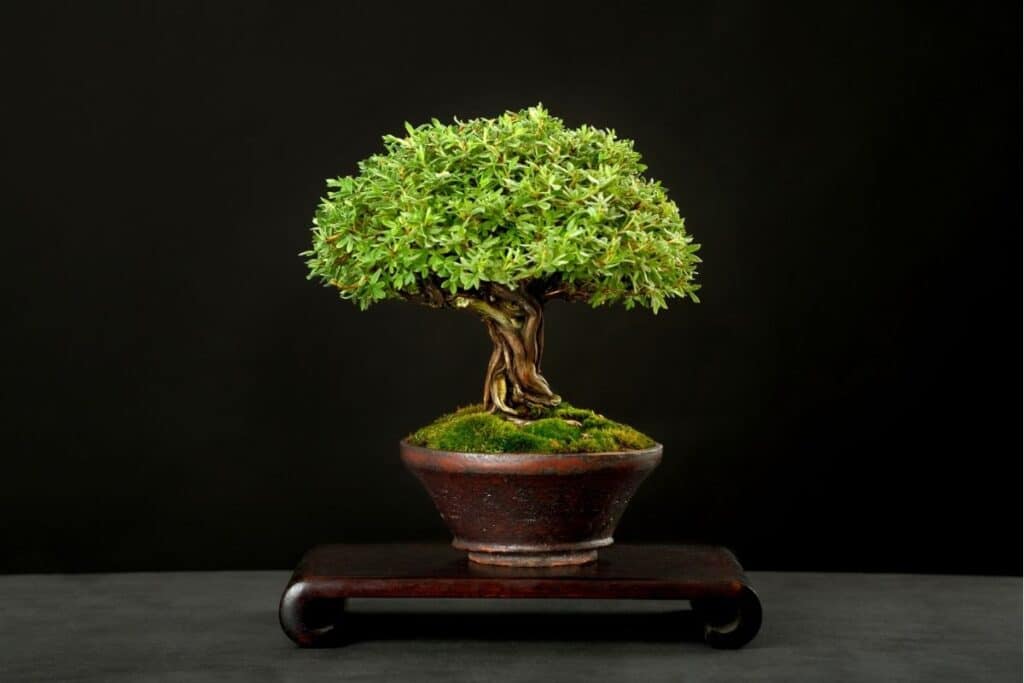The art of bonsai dates back centuries. It’s a highly respected art form and a deeply symbolic, sacred practice with its integral elements of simplicity, harmony, and balance also reflected within many aspects of Japanese culture, and their way of life.
Dating back 2000 years in cultivation, this Japanese art form was inspired by the Chinese art of Penjing, which was brought to Japan from China, and then was shaped and influenced by the minimalist Buddist culture to resemble simple, miniature landscapes.
Every artistic element, down to the tiniest of details, is intentionally orchestrated, and is combined to create a story and lend to the aesthetics, deeper bonsai meanings, and symbolism within each tree species. Each individual bonsai is an art form created with the purpose of eliciting emotions from the viewer.
What is the Art of Bonsai?

Bonsai is a Japanese term that means “planted in a container.” It refers to the art of growing miniature trees in pots, which are pruned and shaped to resemble a full-sized tree in nature.
Bonsai trees can range from just a few inches tall to several feet, depending on the variety and the age of the tree. The goal of bonsai is to create a natural-looking tree that reflects the beauty and balance of nature.
Bonsai has its roots in ancient China, where miniature trees were grown in shallow containers and displayed as part of the landscape paintings. The art of bonsai spread to Japan in the 14th century, where it evolved into a sophisticated art form.
Bonsai trees became a symbol of status and prestige, and the cultivation and care of bonsai became a highly respected craft. Today, bonsai is practiced all over the world, and there are many different styles and techniques for growing and maintaining bonsai trees.
Caring for Bonsai Trees
Growing bonsai trees requires patience, care, and attention to detail. The process starts with selecting the right species of tree, which should be one that is suited to the local climate and soil conditions.
Once you have selected your tree, it’s time to choose a pot and begin the process of shaping and pruning. The key to growing a successful bonsai tree is to keep the tree in its natural shape while maintaining its miniature size. This requires regular pruning, wiring, and repotting to keep the tree healthy and thriving.
Bonsai is more than just a hobby; it’s a way of life. Practicing bonsai can help you cultivate patience, mindfulness, and a deeper appreciation for nature.
Growing and maintaining bonsai trees also requires a great deal of focus and attention to detail, which can help you develop a keen sense of discipline and precision.
Plus, bonsai trees make beautiful and unique decorations for your home or office, and they can be passed down from generation to generation as family heirlooms.
so, you’re ready to start your bonsai journey. Where do you begin? By choosing the right bonsai trees for your project!
What Do Bonsai Trees Represent?

So, what does a bonsai tree symbolize? In general, miniature trees are believed to bring good luck and harmony, but bonsai tree symbolism can be unique to every tree.
In this article, we outline the meaning and symbolism of nine common bonsai trees.
So, what does a bonsai tree represent?
1. Azalea Bonsai Trees Symbolic Meaning
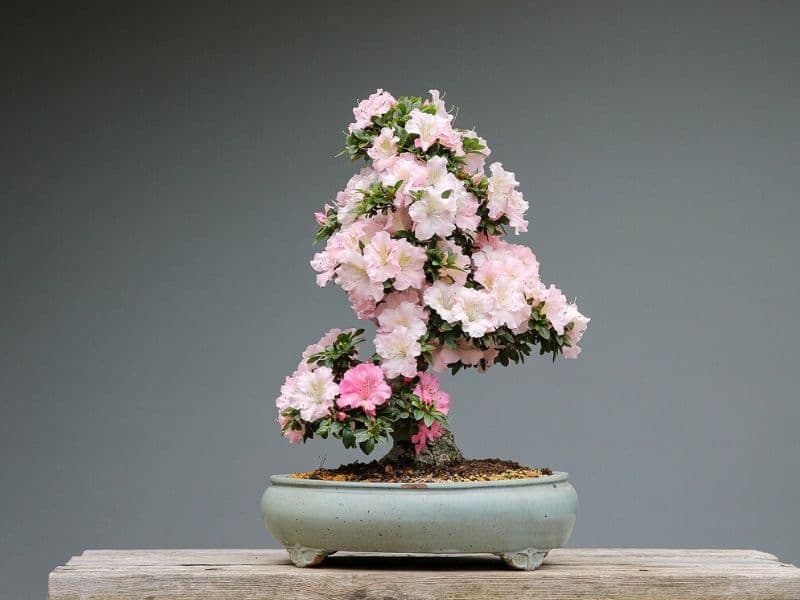
An Azalea bonsai is an especially stunning symbol of femininity. Its bright blossoms represent feminine beauty, vulnerability, and gentleness. This makes it excellent bonsai material.
Its cloud of bright pink, white, or red flowers bloom at their conventional size despite blossoming on what appears to be a flowering miniature tree. This happens because bonsai are grown from the same seeds as their full-grown tree counterparts. They’re even genetically the same. Bonsai are simply pruned to remain miniature, they aren’t genetically dwarfed trees.
Also associated with an Azalea bonsai is abundance, passion, wealth, and love, with abundance applying to wealth, intelligence, and beauty.
An Azalea bonsai is often gifted to a loved one and can be especially meaningful if given to a beloved woman in your life.
2. Ficus Bonsai Trees
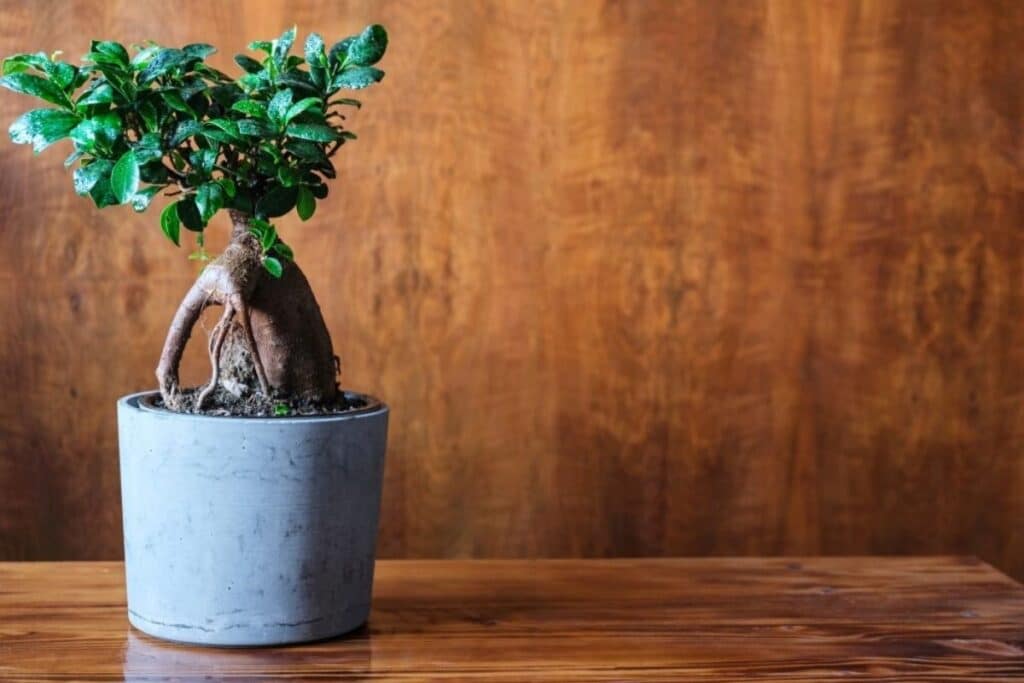
Ficus bonsai is referred to as a “cheerful tree” because it is thought to enhance the moods of those who are nearby. This bonsai symbolizes unity, new beginnings, abundance, simplicity, and the harmony of nature.
It is also believed that having a ficus in the home will release positivity and understanding.
Ficus is one of the most popular indoor bonsai because it is notoriously low maintenance. For this reason, it is popularly gifted and is considered one of the best beginner bonsai.
3. Jade Bonsai Trees
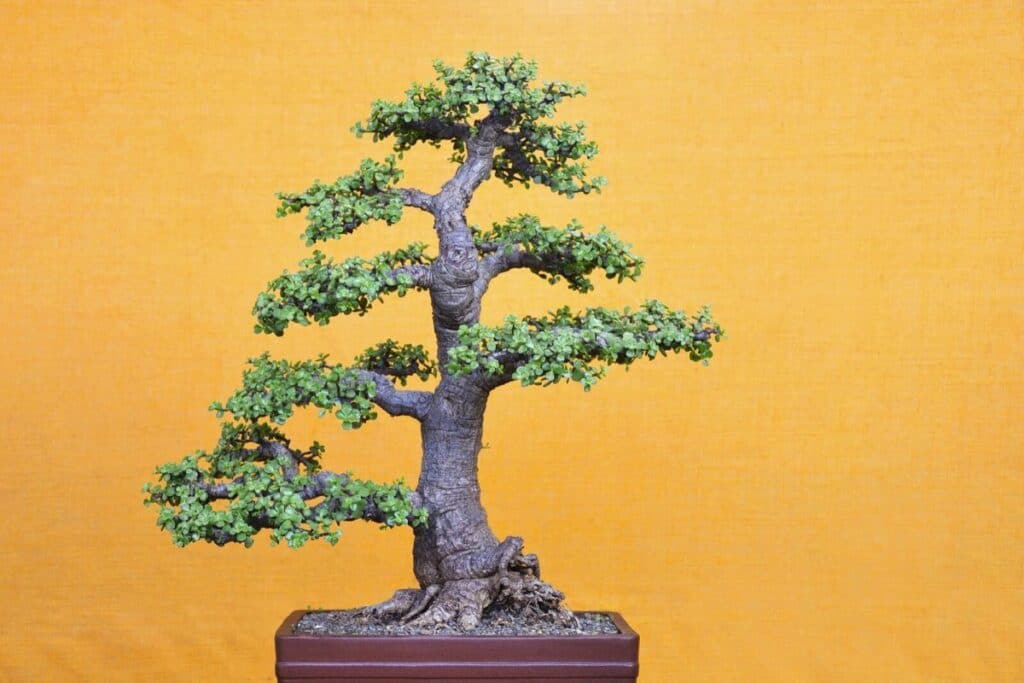
According to feng shui, Jade bonsai produces positive vibrations and attracts good luck, money and prosperity into your life. This is why it is commonly referred to as the lucky money tree, the money plant, and the friendship plant.
Jade’s vibrant green leaves symbolize positive energy, growth, renewal, and great friendship.
Gifting Jade is a traditional feng shui practice and is commonly given to business owners, because placing a Jade plant near the entrance, near the cash register, or in a southeast location of the space brings prosperity and success to the business.
Placing Jade in the southeast corner of the room or desk is also considered very auspicious.
Another asset attributed to this succulent plant is that it is great for beginners, as it is one of the easiest indoor bonsai to maintain because it requires minimal tending and watering.
4. Juniper Bonsai Trees
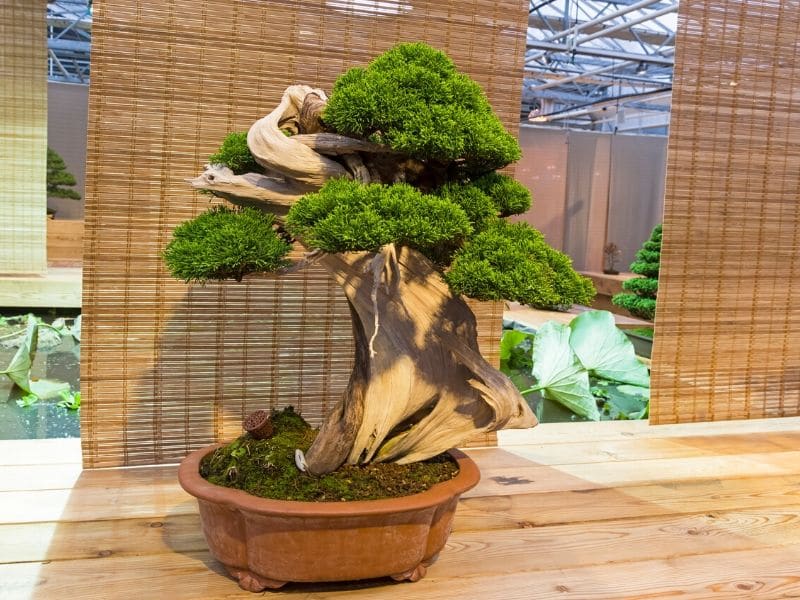
Juniper is a long-lived, coniferous evergreen that is a symbol of protection, and is said to ward off evil spirits. It also represents the cleansing and purification of those nearby and even produces berry-like cones that are used in health and healing rituals.
The Juniper bonsai tree is also a symbol of power and strength, representing the ability to overcome life’s inevitable challenges.
5. Cherry Blossom Bonsai Trees
The Cherry Blossom is Japan’s national flower, so it makes sense that Cherry Blossom bonsai would be deeply symbolic, with a deep cultural significance to any Japanese person. You can say the Cherry Blossom bonsai is their national bonsai tree.
Producing delicate pink flowers that have an extremely short blooming period, Japanese zen Buddhist monks associate Cherry Blossoms with mindfulness, mortality, and living in the present moment. The beautiful, yet quickly fleeting flowers are a reminder that life is to be lived fully in the moment, for it too is fleeting.
Flowering Japanese bonsai traditionally represent femininity. Specifically, the Cherry Blossom represents female dominance, strength and beauty.
The Japanese also associate the Cherry Blossom with renewal and rebirth, celebrating their two weeks in bloom every spring, and welcoming new beginnings and the year ahead.
6. Chinese Elm Bonsai Trees
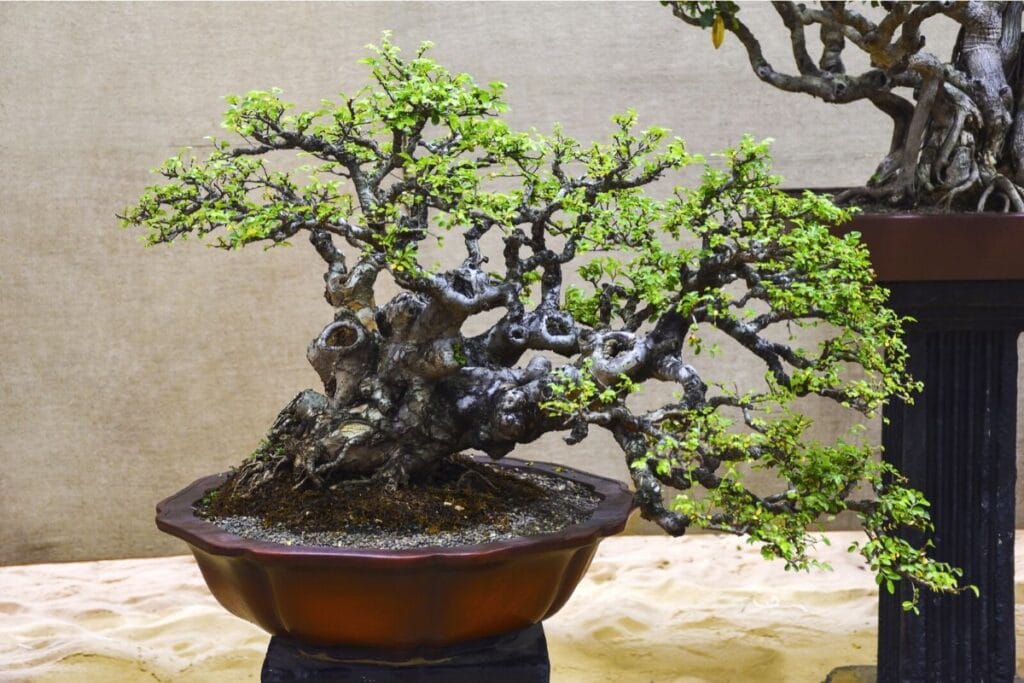
The Chinese Elm is often referred to as the “tree of harmony” because it symbolizes inner strength, intuition, wisdom, and love.
The Elm is thought to be a magical tree, offering predictions and protection and it is often planted in front of homes and churches, as it is thought to be a good omen.
7. Maple Bonsai Trees
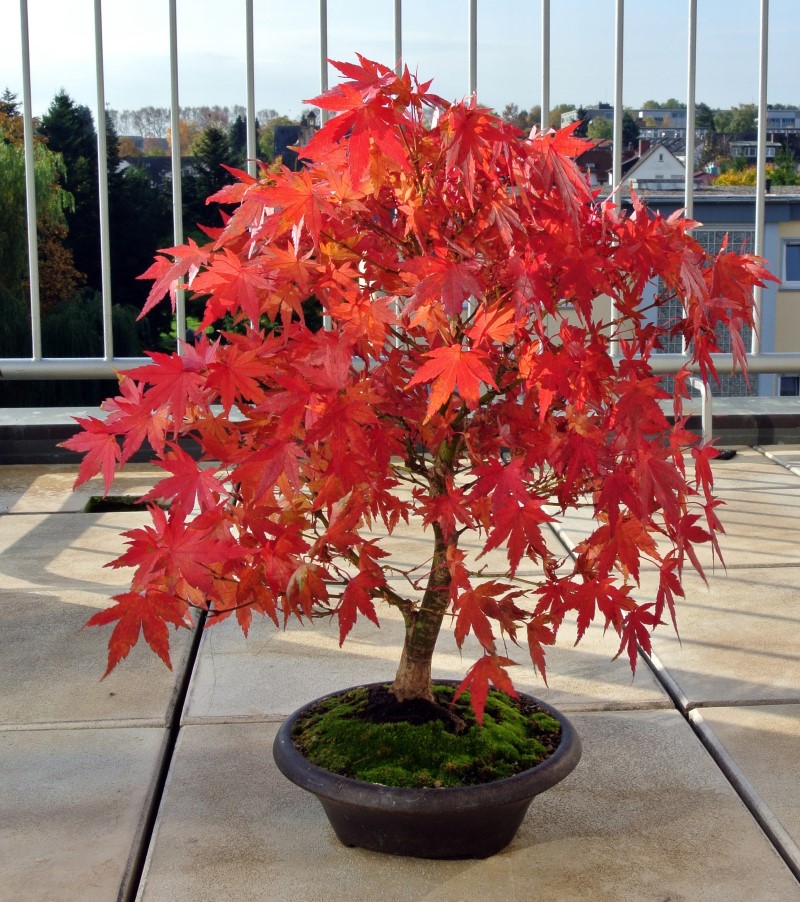
Adorned with lovely bright red, yellow, and orange foliage in the autumn, the Japanese Maple tree has been admired and associated with elegance and beauty for thousands of years. Maple trees and their color changing, falling leaves are frequently represented in Japanese art and mentioned in their literature.
Maple bonsai is also a symbol of peace, serenity, balance and practicality, with the Japanese word for this tree translating to “peace” or “calm.”
8. Cedar Bonsai Trees

Due to their conventional size, shape and longevity, Cedar trees are a symbol for immortality, strength, and protection.
Cedar is a ceremonial plant that is traditionally used as an incense and it is associated with prayer and medicinal healing. The bark and leaves of the Cedar tree are used as medicine and it is considered a purifying herb.
9. Oak Bonsai

Their strong trunks, long lives, and associations with powerful Gods make Oak bonsai a symbol of strength, longevity, and knowledge.
Oak trees are suited for bonsai because of their tough trunks, aged bark, and the ability to endure constant pruning.
Regarded as a storehouse of knowledge and spiritual wisdom, the Oak tree’s longevity is symbolic of loyalty and eternal life.
Final Thoughts

Not only are bonsai believed to produce and promote positive “chi” or energy, but small trees are also commonly considered a means to help naturally ease anxiety and to help you attain inner peace and serenity.
When choosing a bonsai tree to gift someone or learning how to grow a bonsai tree and add to your own collection, it is important to consider the energetic associations and the symbolic meanings when you grow dwarf trees.
Gifting a bonsai is actually believed to double the fortune that is found by the recipient, therefore, it’s vital to learn about bonsai tree meaning. As pieces of living art, these potted trees planted in decorative containers invite care, nurturing, patience and positivity into your life.
Featured photo by depositphotos.com/HavlicekRadek

